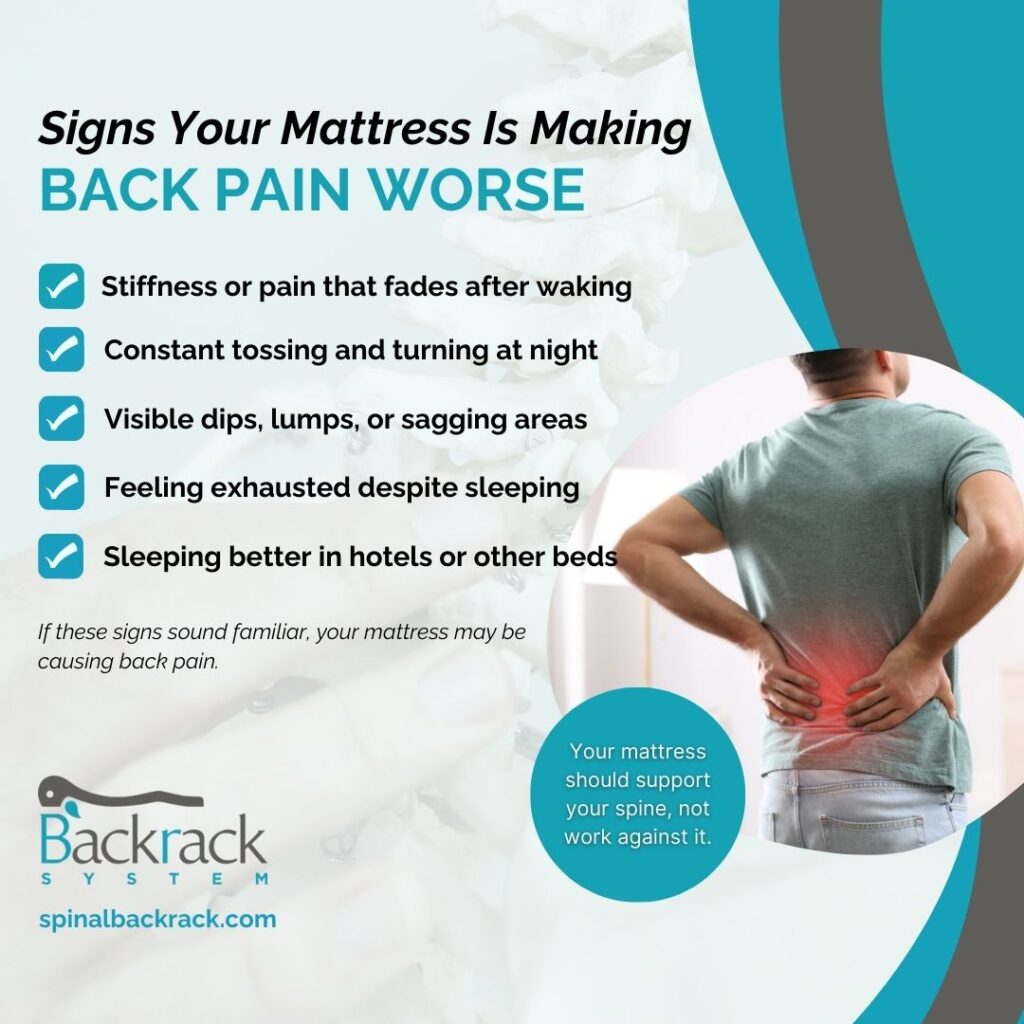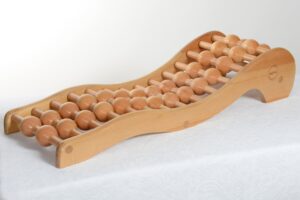
Does a bad mattress cause back pain? Yes. It can. And if you’ve ever woken up feeling stiff, sore, or more tired than when you went to bed, your mattress could be a major reason.
Many people assume back pain only comes from injuries, poor posture, or aging. But what you sleep on every night matters just as much. The wrong mattress can mess with your spine’s natural alignment, make existing pain worse, and stop your body from healing properly while you rest.
If you’re looking for a way to manage back pain without relying on medication or costly treatments, your mattress might be the best place to start. The good news? You don’t have to spend thousands of dollars on the latest model to feel better. Let’s break it down.
The spine has three natural curves. A good mattress supports those curves. A bad one doesn’t. Your spine may twist or flatten if your mattress is overly hard, too soft, or sagging. As a result, your neck, shoulders, and lower back are tensed.
And this doesn’t just hurt while you sleep. The strain can carry over into your day whether you sit at a desk, work on your feet, or stay active. Because your body never gets a break, pain accumulates. Rest is supposed to restore. The damage will continue to accumulate if your mattress fails at that point. So, does a bad mattress cause back pain? Yes, definitely!

You don’t need to guess. Here’s what to watch for:
If any of these sound familiar, your mattress could be working against you. The question many are asking is, does a bad mattress cause back pain? Absolutely. Especially if it’s doing any of the above.
Absolutely. Some materials are better at supporting the spine than others.
Memory foam molds to your body. That’s helpful for reducing pressure points, but if the foam is too soft or low quality, it can sink too much. Over time, that results in drooping and inadequate support.
These have coils inside for support. A firm innerspring mattress can be helpful for back support, but if there’s not enough padding on top, it can create pressure on your hips and shoulders.
These combine coils with foam or latex. They offer both support and comfort when built well. Not all hybrids are created equal, though. Some use cheap foam that wears out fast.
Natural latex is durable and supportive. It tends to hold its shape better over time and offers consistent support across the body. These can be pricey upfront, but they last long and provide good alignment.
So, does a bad mattress cause back pain? Yes. And the material plays a role in that.
Most mattresses last 7 to 10 years. After that, the internal structure breaks down, even if it looks okay on the outside. It is time to consider replacing your mattress if it is older than that or if you are already noticing wear.
That said, price doesn’t always equal quality. A $3,000 mattress isn’t guaranteed to fix your back. How well it distributes your weight and supports your spine is what counts.
Does a bad mattress cause back pain? Indeed. It’s also more prevalent than most people realize.
We get it. Mattresses are expensive. If you’re not ready to buy a new one, there are other ways to improve your sleep setup.
A mattress that is sagging or too soft can be supported by a hard, high-density foam topper. It won’t fix the core problem, but it can buy you time.
Your mattress will wear more evenly if you turn it every three to six months. It won’t work miracles, but it can reduce pressure spots.
For the mattress that is sinking, put plywood between it and the bed frame to add a firmer base.
Devices like the Spinal Backrack can help correct your posture while you sleep or rest. It’s specialist-designed, non-invasive, and drug-free at-home option that aligns your spine and eases pressure.
These options won’t replace a proper mattress forever, but they can reduce pain while you save for a better setup.
Does a Bad Mattress Cause Back Pain? Yes, it does. Mattress aside, how you sleep affects your spine.
You can have the best mattress in the world, but if you’re sleeping twisted or flat on your stomach every night, your spine’s still under pressure.
Fixing your mattress helps. However, better sleep alone is not enough for long-term back health. These actions safeguard your spine in conjunction with your mattress.
Move more. If you sit all day, take breaks to stand and stretch every 30 minutes.
Pain relief doesn’t have to mean endless appointments or pills. Small daily changes make a big difference.
Yes, a bad mattress causes back pain by throwing off your spinal alignment, increasing pressure points, and stopping your body from getting the rest it needs to heal.
But here’s the thing: you don’t need to spend a fortune to fix it. Understanding your needs, making small adjustments, and using support tools like the Spinal Backrack can give you real relief. Especially if you’re looking for a non-invasive, drug-free, specialist-approved way to manage pain from home. Back pain doesn’t have to be part of your normal.
Your mattress plays a huge role in how you feel each morning. If it’s working against you, that pain isn’t going anywhere. Make some changes now your spine will thank you later.
Yes. The Spinal Backrack is a clinically tested device that helps decompress the spine and relieve back pain. It is designed to be used at home and works as a natural complement to a supportive mattress.
Yes. A mattress that does not support the spine’s natural curves, whether it is too soft, too firm, sagging, or worn out, can misalign the spine, strain muscles, and aggravate or even trigger back pain.
Medical evidence favors medium-firm mattresses, as they tend to offer the right balance of support and comfort for spinal alignment. Materials matter too. Latex and well-constructed hybrids are known for maintaining shape and offering consistent support.
You can explore expert resources and innovative products on our website Spinal Backrack. From educational articles to the Backrack spinal decompression device, everything is designed to help you take control of your back health naturally.








Sign up our newsletter to get article update about backrack therapy.